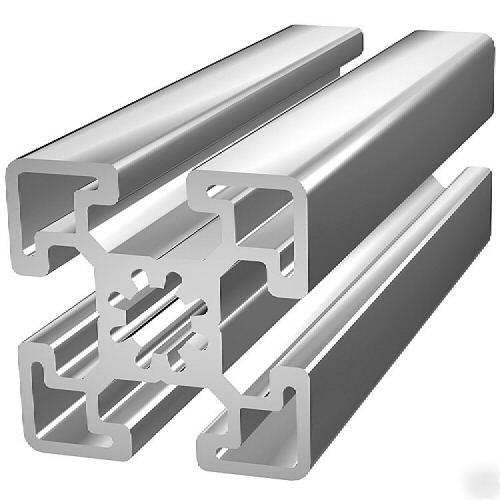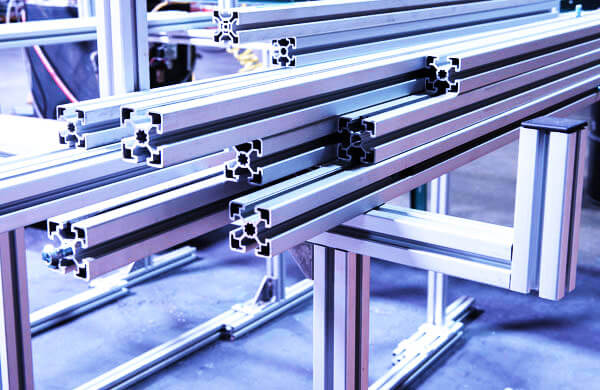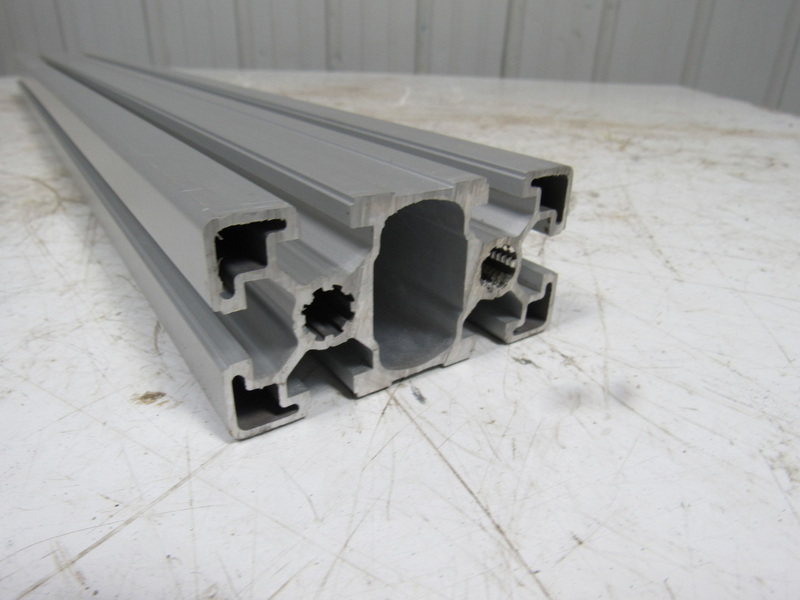Content Menu
● Understanding 80x20 Aluminum Extrusions
● Key Industries Utilizing 80x20 Aluminum Extrusions
>> 1. Manufacturing
>> 2. Automotive
>> 3. Aerospace
>> 4. Electronics
>> 5. Renewable Energy
>> 6. Construction
>> 7. Food Service Industry
>> 8. Robotics
● Conclusion
● Frequently Asked Questions
>> 1: What Are the Main Benefits of Using 80x20 Aluminum Extrusions?
>> 2: How Do I Choose the Right Size of Aluminum Extrusion?
>> 3: Can I Customize My Aluminum Extrusion Design?
>> 4: Are There Any Limitations to Using Aluminum Extrusions?
>> 5: How Do I Maintain Structures Made from Aluminum Extrusion?
80x20 aluminum extrusions, widely recognized for their versatility and strength, are a popular choice across various industries. This article explores the key sectors that utilize these extrusions, detailing the reasons for their widespread adoption. As we delve into the applications of 80x20 aluminum extrusions, we will also highlight their benefits and provide visual aids to enhance understanding.

Understanding 80x20 Aluminum Extrusions
80x20 aluminum extrusions are part of a modular framing system that allows for the construction of custom structures. The "80/20" designation refers to the company that pioneered this system, which has become synonymous with T-slot aluminum framing. These extrusions feature T-shaped grooves that facilitate easy assembly and disassembly, making them ideal for dynamic environments where modifications may be necessary.
The primary advantages of using 80x20 aluminum extrusions include:
- Lightweight: Aluminum is significantly lighter than steel, which reduces shipping costs and makes handling easier.
- Corrosion Resistance: Aluminum naturally resists corrosion, making it suitable for various environments.
- Strength-to-Weight Ratio: The high strength-to-weight ratio allows for robust structures without excessive weight.
- Ease of Assembly: The T-slot design enables quick assembly with minimal tools.
- Reusability: Structures can be easily modified or reconfigured as needs change.
Key Industries Utilizing 80x20 Aluminum Extrusions
1. Manufacturing
In the manufacturing sector, 80x20 aluminum extrusions are extensively used for building workstations, assembly lines, and storage solutions. Their modular nature allows manufacturers to adapt layouts quickly to optimize workflow and efficiency. The lightweight yet sturdy profiles can support various equipment and tools, enhancing productivity on the shop floor.
The adaptability of these extrusions is particularly beneficial in environments where production needs can change rapidly. For instance, in a factory setting, if a new product line is introduced, the existing workstations can be reconfigured without significant downtime. This flexibility not only saves time but also reduces labor costs associated with building new structures from scratch.
2. Automotive
The automotive industry leverages 80x20 aluminum extrusions for constructing vehicle frames and components. The lightweight properties of aluminum contribute to improved fuel efficiency and reduced emissions, making it an essential material in modern automotive design. Additionally, the strength of these extrusions ensures safety and durability in vehicle construction.
As automakers strive to meet stringent environmental regulations, the use of lightweight materials like aluminum becomes increasingly critical. By incorporating 80x20 aluminum extrusions into vehicle designs, manufacturers can achieve significant weight reductions without compromising structural integrity. This shift not only enhances performance but also aligns with sustainability goals by lowering carbon footprints.
3. Aerospace
In aerospace applications, weight reduction is critical for performance and fuel efficiency. 80x20 aluminum extrusions are used in aircraft structures, including fuselages and wings. The corrosion resistance of aluminum also plays a significant role in enhancing the longevity of aerospace components exposed to harsh environmental conditions.
The aerospace industry demands materials that can withstand extreme conditions while maintaining performance standards. The use of 80x20 aluminum extrusions allows engineers to design components that are both lightweight and robust enough to endure the stresses of flight. Furthermore, advancements in aluminum alloy technology continue to improve the properties of these materials, making them even more suitable for aerospace applications.
4. Electronics
The electronics industry utilizes 80x20 aluminum extrusions for creating enclosures and heat sinks for electronic devices. The excellent thermal conductivity of aluminum ensures efficient heat dissipation, preventing overheating in compact electronic assemblies. This application is crucial as electronic devices continue to shrink while increasing in power.
As technology advances, electronic devices become more powerful yet smaller in size. This miniaturization creates challenges related to heat management; however, the use of 80x20 aluminum extrusions addresses this issue effectively. By designing custom enclosures that maximize airflow and heat dissipation capabilities, manufacturers can enhance the reliability and longevity of their products.

5. Renewable Energy
As the world shifts towards sustainable energy sources, 80x20 aluminum extrusions find applications in solar panel frames and wind turbine structures. Their lightweight yet robust nature allows for efficient installation and maintenance while ensuring structural integrity under various environmental conditions.
In renewable energy projects, where efficiency and durability are paramount, 80x20 aluminum extrusions provide an ideal solution. They can be easily integrated into solar tracking systems that optimize energy capture by adjusting panel angles throughout the day. Additionally, their resilience against weather elements ensures that renewable energy installations remain operational even under challenging conditions.
6. Construction
In construction, 80x20 aluminum extrusions are used for scaffolding systems, railings, and architectural elements. Their aesthetic appeal combined with functionality makes them suitable for both structural and decorative applications within buildings.
The ability to create visually appealing structures without sacrificing strength is a significant advantage in construction projects. Architects often choose 80x20 aluminum extrusions for their designs because they offer flexibility in form while maintaining high standards of safety and durability.
7. Food Service Industry
The food service industry employs 80x20 aluminum extrusions in kitchen equipment and display cases due to their hygienic properties and ease of cleaning. The corrosion resistance of aluminum is particularly valuable in environments where moisture is prevalent.
In commercial kitchens where cleanliness is crucial, using materials that resist bacteria growth is essential. The smooth surfaces of anodized aluminum make it easy to maintain hygiene standards while providing robust support for kitchen equipment like shelving units and food prep stations.
8. Robotics
In robotics, 80x20 aluminum extrusions serve as the backbone for robotic arms and automated systems. Their modular design allows engineers to create custom solutions tailored to specific tasks while ensuring stability and precision.
The robotics field demands materials that can withstand dynamic movements while providing precise control over mechanisms. By utilizing 80x20 aluminum extrusions, engineers can construct lightweight yet strong frameworks that enhance robotic performance across various applications—from industrial automation to research laboratories.
Conclusion
The versatility of 80x20 aluminum extrusions makes them a preferred choice across numerous industries, from manufacturing to renewable energy. Their lightweight nature, strength-to-weight ratio, corrosion resistance, and ease of assembly contribute significantly to their widespread adoption. As industries continue to evolve, the demand for adaptable materials like 80x20 aluminum extrusions will likely increase, driving innovation and efficiency in various applications.

Frequently Asked Questions
1: What Are the Main Benefits of Using 80x20 Aluminum Extrusions?
The main benefits include lightweight construction, corrosion resistance, high strength-to-weight ratio, ease of assembly, and reusability.
2: How Do I Choose the Right Size of Aluminum Extrusion?
Choosing the right size depends on your specific application requirements such as load capacity, structural integrity needed, and available space for installation.
3: Can I Customize My Aluminum Extrusion Design?
Yes! One of the key advantages of 80x20 aluminum extrusions is their modularity; you can easily customize designs by adding or removing components as needed.
4: Are There Any Limitations to Using Aluminum Extrusions?
While they are highly versatile, limitations include potential bending under excessive loads if not properly designed and higher costs compared to some other materials like steel.
5: How Do I Maintain Structures Made from Aluminum Extrusion?
Maintenance typically involves regular cleaning to prevent dirt buildup; additionally, inspecting joints and connections periodically ensures long-term stability and performance.






















